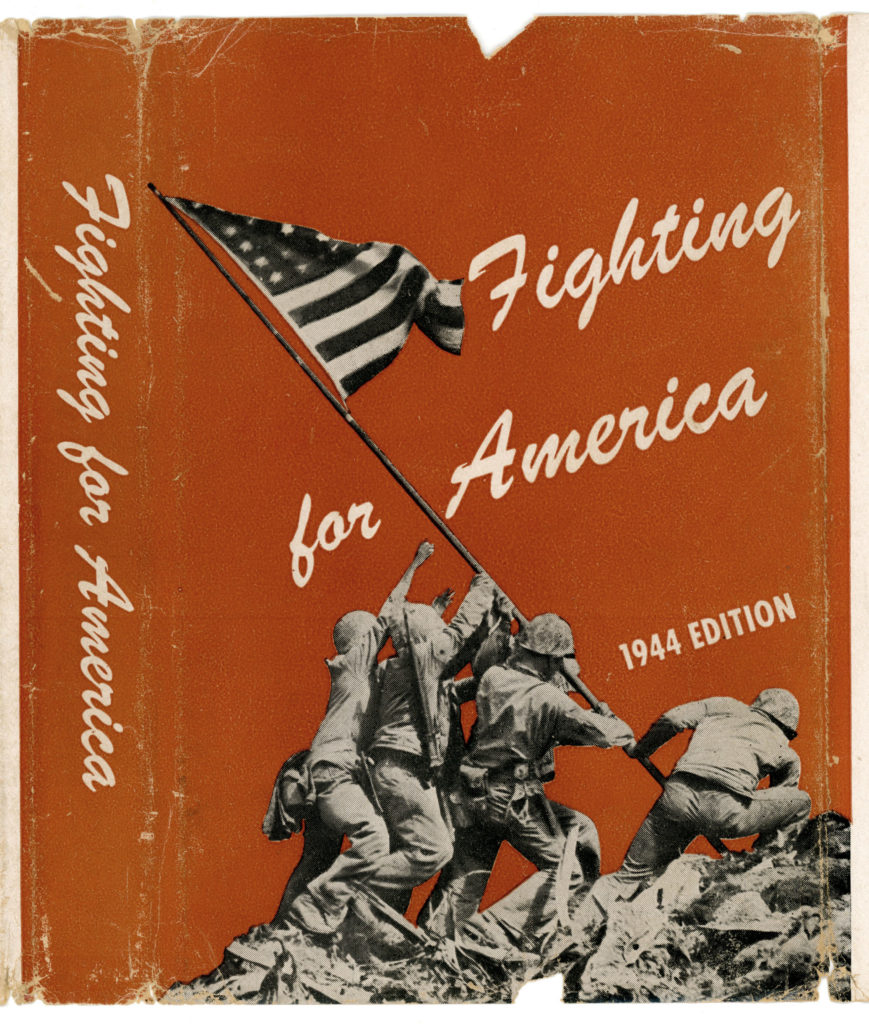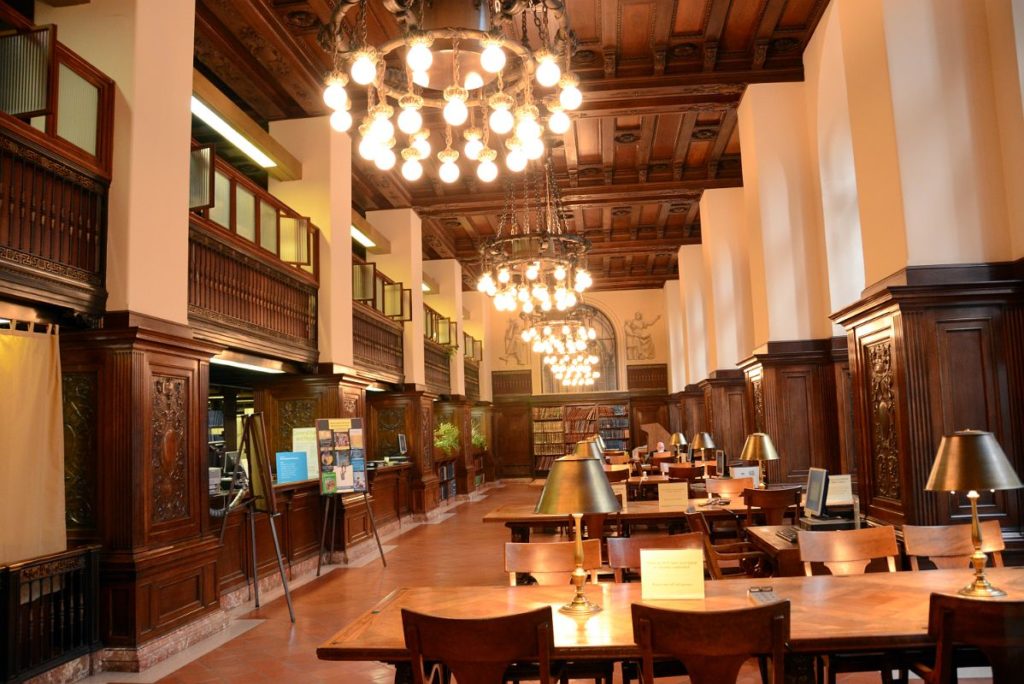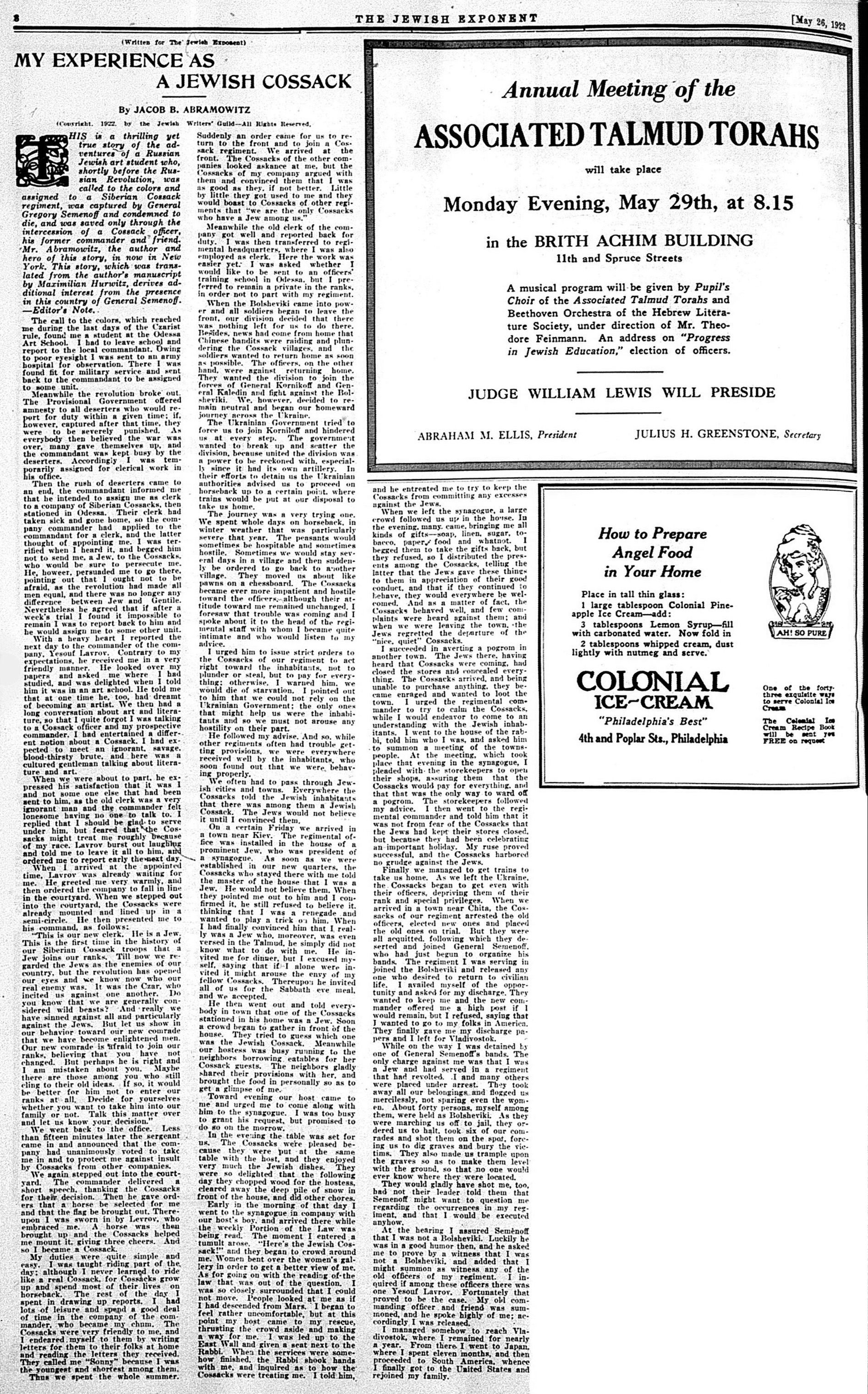In the same way that The Jewish Chronicle (London) accorded great attention to Jewish military service during World War One – naturally focusing on Jewish soldiers of the Commonwealth countries – so did The Jewish Exponent (of Philadelphia) report on Jews in the American military during that time.* However, given that America’s military effort in “The Great War” substantively commenced in 1917, the number of such news items in The Exponent is far fewer – and far less systematically presented – than such items in the Chronicle.
Given the scope, nature, and effects of World War One, with the major military campaigns in the “East” transpiring across the geographic and demographic “center” of European Jewry (Poland and the Ukraine) the Exponent and especially the Chronicle presented detailed and lengthy articles about the activities, experiences, and travails of – and appalling suffering endured by – Jewish civilians living in those regions. This coverage would continue well into the early 1920s.
The following article is one such item, and a very unusual one, at that: An account by Jacob Abramowitz, Russian Jewish art student, concerning his military service in a company of Siberian Cossacks, which appeared in the Exponent in 1922.
A web search for information about the author yields a solitary entry: In Volume 19, Issue 1, of the U.S. Government Printing Office Publication of January 1, 1923, of “Catalogue of Copyright Entries: Pamphlets, leaflets, contributions to newspapers or periodicals, etc.; lectures, sermons, addresses for oral delivery; dramatic compositions, maps; motion pictures,” under page 665 – “Books”, appears the listing: “Abramowitz (Jacob B.) My Experiences as a Jewish Cossack, by Jacob B. Abramowitz, tr. by Maximilian Hurwitz. (In Jewish Tribune)”. Otherwise, he remains an enigma.
The “General Grigory Semyonov” referred to in the story is – according to Wikipedia – Grigoriy Mikhaylovich Semenov (Григорий Михайлович Семёнов). Born in 1890 in the Transbaikal region of Eastern Siberia, he served as a Cossack Ensign in WW I, where he earned the George Cross in battle against the Germans and Austro-Hungarians. After the Russian Revolution, he fled to Harbin, China. He left Russian territory by 1921, eventually living in Nagasaki, and then the United States. He subsequently returned to China, where he was captured by Soviet Military forces in 1945. Charged with counter-revolutionary activities, he was executed in 1946. (The information in this Wikipedia entry is derived from the 2009 book White Terror: Cossack Warlords of the Trans-Siberian, by Jamie Bisher.)
According to a biographical note in a short story penned for the February, 1920, issue of The American Hebrew, Maximilian Hurwitz was, “Born in Shati, Russia, in 1887; came to American in 1904, and was educated in the schools of Pittsburgh, Pa. (University of Pittsburgh, A.B., 1915.)” He served on the staff of The Jewish News.
With very great irony, Hurwitz’s story, “Eili, Eili, Lomo Asavtoni?” (“My God, My God, why hast Thou forsaken me?”) – from which I extracted the above biographical data – was itself written to commemorate, “the Jewish martyrs who fell in the recent massacres in Poland and the Ukraine”…
And so, Jacob Abramowitz’s story follows below.
As to its veracity, I have no idea.
But, it is an interesting read, with a mild air of Isaac Babel to it…
* This applies even moreso to coverage of Jewish military service in WW II. More about that – much (much) more, I hope – in the future.
____________________
(Following the format of my prior posts concerning articles from The Jewish Chronicle of 1914, the story can be accessed in PDF format, here.)
____________________
For more about this period of history, I strongly suggest The Slaughter of the Jews In the Ukraine in 1919, by Elias Heifetz, published in 1921, and, David Vital’s magisterial 1999 book, A People Apart – A Political History of the Jews in Europe, 1789-1939. More recently, this tragic period of Jewish history – seemingly superseded in Jewish collective memory by geographic and psychological distance, and especially the magnitude of the Shoah only two decades later – was the subject of a Discussion at YIVO – “A Forgotten Genocide: The Pogroms in Ukraine, 1918-1919, and their Impact on Memory and Politics” – on May 16, 2016, with videos of the four presentations available here.
____________________
My Experience as a Jewish Cossack
The Jewish Exponent
May 26, 1922
By Jacob A. Abramowitz
(Copyright 1922 by the Jewish Writer’s Guild – All Rights Reserved)
This is a thrilling yet true story of the adventures of a Russian Jewish art student who, shortly before the Russian Revolution, was called to the colors and assigned to a Siberian Cossack regiment, was captured by General Gregory Semenoff and condemned to die, and was saved only through the intercession of a Cossack officer, his former commander and friend. Mr. Abramowitz, the author and hero of this story, which was translated from the author’s manuscript by Maximilian Hurwitz, derives additional interest from the presence in this country of General Semenoff. – Editor’s Note.
The call to colors, which reached me during the last days of the Czarist rule, found me a student at the Odessa Art School. I had to leave school and report to the local commandant. Owing to poor eyesight I was sent to an army hospital for observation. There I was found fit for military service and sent back to the commandant to be assigned to some unit.
Meanwhile the revolution broke out. The Provisional Government offered amnesty to all deserters who would report for duty within a given time; if, however, captured after that time, they were to be severely punished. As everybody then believed the war was over, many gave themselves up, and the commandant was kept busy by the deserters. Accordingly I was temporarily assigned for clerical work in his office.
Then the rush of deserters came to an end, the commandant informed me that he intended to assign me as a clerk to a company of Siberian Cossacks, then stationed in Odessa. Their clerk had taken sick and gone home, so the company commander had applied to the commandant for a clerk, and the latter thought of appointing me. I was terrified when I heard of it, and begged him not to send me, a Jew, to the Cossacks, who would be sure to persecute me. He, however, persuaded me to go there, pointing out that I ought not to be afraid, as the revolution had made all men equal, and there was no longer any difference between Jew and Gentile. Nevertheless he agreed that if after a week’s trial I found it impossible to remain I was to report back to him and he would assign me to some other unit.
With a heavy heart I reported the next day to the commander of the company, Yesouf Lavrov. Contrary to my expectations, he received me in a very friendly manner. He looked over my papers and asked me where I had studied, and was delighted when I told him it was an art school. He told me that at one time he, too, had dreamt of becoming an artist. We then had a long conversation about art and literature, so that I quite forgot I was talking to a Cossack officer and my prospective commander. I had entertained a different notion about a Cossack. I had expected to meet an ignorant, savage, blood-thirsty brute and here was a cultured gentleman talking about literature and art.
When we were about to part, he expressed his satisfaction that it was I and not some one else that had been sent to him, as the old clerk was a very ignorant man and the commander felt lonesome having no one to talk to. I replied that I should be glad to serve under him, but feared that the Cossacks might treat me roughly because of my race. Lavrov burst out laughing and told me to leave it all to him, and ordered me to report early the next day.
When I arrived at the appointed time, Lavrov was already waiting for me. He greeted me very warmly, and then ordered the company to fall in line in the courtyard. When we stepped out into the courtyard, the Cossacks were already mounted and lined up in a semi-circle. He then presented me to his command, as follors:
“This is our new clerk. He is a Jew. This is the first time in the history of our Siberian Cossacks troops that a Jew joined our ranks. Till now, we regarded the Jews as the enemies of our country, but the revolution has opened our eyes and we know now who the real enemy was. It was the Czar, who incited us against one another. Do you know that we are generally considered wild beasts? And really we have sinned against all and particularly against the Jews. But let us show in our behavior toward our new comrade that we have become enlightened men. Our new comrade is afraid to join our ranks, believing that you have not changed. But perhaps he is right and I am mistaken about you. Maybe there are those among you who still cling to their old ideas. If so, it would be better off for him not to enter our ranks at all. Decide for yourselves whether you want to take him into our family or not. Talk this matter over and let us know your decision.”
We went back to the office. Less than fifteen minutes later the sergeant came in and announced that the company had unanimously voted to take me in and to protect me against insult by Cossacks from other companies.
We again stepped out into the courtyard. The commander delivered a short speech, thanking the Cossacks for their decision. Then he gave orders that a horse be selected for me and that the flag be brought out. Thereupon I was sworn in by Levrov, who embraced me. A horse was then brought up and the Cossacks helped me mount it, giving three cheers. And so I became a Cossack.
My duties were quite simple and easy. I was taught riding part of the day, although I never learned to ride like a real Cossack, for Cossacks grow up and spend most of their lives on horseback. The rest of the day I spent in drawing up reports. I had lots of leisure and spent a good deal of time in the company of the commander, who became my chum. The Cossacks were very friendly to me, and I endeared myself to them by writing letters for them to their folks at home and reading the letters they received. The called me “Sonny” because I was the youngest and shortest among them.
Thus we spent the whole summer. Suddenly an order came for us to report to the front and to join a Cossack regiment. We arrived at the front. The Cossacks of the other companies looked askance at me, but the Cossacks of my company argued with them and convinced them that I was as good as they, if not better. Little by little they got used to me and they would boast to Cossacks of other regiments that “we are the only Cossacks who have a Jew among us.”
Meanwhile the old clerk of the company got well and reported back for duty. I was then transferred to regimental headquarters, where I was also employed as a clerk. Here the work was easier yet. I was asked whether I would like to be sent to an officers training school in Odessa, but I preferred to remain a private in the ranks, in order not to part with my regiment.
When the Bolsheviki came into power and all our soldiers began to leave the front, our division decided that there was nothing left for us to do there. Besides, news had come from home that Chinese bandits were raiding and plundering the Cossack villages, and the soldiers wanted to return home as soon as possible. The officers, on the other hand, were against returning home. They wanted the division to join the forces of General Kornikoff and General Kaledin and fight against the Bolsheviki. We, however, decided to remain neutral and began our homeward journey across the Ukraine.
The Ukrainian government tried to force us to join Korailoff and hindered us at every step. The government wanted to break up and scatter the division, because united the division was a power to be reckoned with, especially since it had its own artillery. In their efforts to detain us the Ukrainian authorities advised us to proceed on horseback up to a certain point, where trains would be put at our disposal to take us home.
The journey was a very trying one. We spent whole days on horseback, in winter weather that was particularly severe that year. The peasants would sometimes be hospitable and sometimes hostile. Sometimes we would stay several days in a village and then suddenly be ordered to go back to another village. The moved us about like pawns on a chessboard. The Cossacks became ever more impatient and hostile toward the officers, although their attitude toward me remained unchanged. I foresaw that trouble was coming and I spoke about it to the head of the regimental staff with whom I became quite intimate and who would listen to my advice.
I urged him to issue strict orders to the Cossacks of our regiment to act right toward the inhabitants, not to plunder or steal, but to pay for everything; otherwise, I warned him, we would die of starvation. I pointed out to that we could not rely on the Ukrainian Government; the only ones that might help us were the inhabitants and so we must not arouse any hostility on their part.
He followed my advice. And so, while other regiments often had trouble getting provisions, we were everywhere received well by the inhabitants, who soon found out that we were behaving properly.
We often had to pass through Jewish cities and towns. Everywhere the Cossacks told the Jewish inhabitants that there was among them a Jewish Cossack. The Jews would not believe it until I convinced them.
On a certain Friday we arrived in a town near Kiev. The regimental office was installed in the house of a prominent Jew, who was president of a synagogue. As soon as we were established in our new quarters, the Cossacks who stayed there with me told the master of the house that I was a Jew. He would not believe them. When they pointed me out to him and I confirmed it, he still refused to believe it, thinking that I was a renegade and wanted to play a trick on him. When I had finally convinced him that I was really a Jew who, moreover, was even versed in the Talmud, he simply did not know what to do with me. He invited me for dinner, but I excused myself, saying that if I alone were invited it might arouse the envy of my fellow Cossacks. Thereupon he invited all of us for the Sabbath eve meal, and we accepted.
He then went out and told everyone in town that one of the Cossacks stationed in his home was a Jew. Soon a crowd began to gather in front of the house. They tried to guess which one was the Jewish Cossack. Meanwhile our hostess was busy running to the neighbors borrowing eatables for her Cossack guests. The neighbors gladly shared their provisions with her, and brought the food in personally so as to get a glimpse of me.
Toward evening our host came to me and urged me to come along with him to the synagogue. I was too busy to grant his request, but promised to do so on the morrow.
In the evening the table was set for us. The Cossacks were pleased because they were put at the same table with the host, and they enjoyed very much the Jewish dishes. They were so delighted that the following day they chopped wood for the hostess, cleared away the deep pile of snow in front of the house, and did other chores.
Early in the morning of that day I went to the synagogue in company with our host’s boy, and arrived there while the weekly Portion of the Law was being read. The moment I entered a tumult arose. “Here’s the Jewish Cossack!” and they began to crowd around me. Women bent over the women’s galley in order to get a better view of me. As for going on with the reading of the law that was out of the question. I was so closely surrounded that I could not move. People looked at me as if I had descended from Mars. I began to feel rather uncomfortable, but at this point my host came to my rescue, thrusting the crowd aside and making a way for me. I was led up to the East Wall and given a seat next to the Rabbi. When the services were somehow finished, the Rabbi shook hands with me, and inquired as to how the Cossacks were treating me. I told him, and he entreated me to try to keep the Cossacks from committing any excesses against the Jews.
When we left the synagogue, a large crowd followed us up in the house. In the evening, many came, bringing me all kinds of gifts – soap, linen, sugar, tobacco, paper, food and whatnot. I begged them to take the gifts back, but they refused, so I distributed the presents among the Cossacks, telling the latter that the Jews gave these things to them in appreciation of their good conduct, and that if they continued to behave, they would everywhere be welcomed. And as a matter of fact, the Cossacks behaved well, and few complaints were heard against them; and when we were leaving the town, the Jews regretted the departure of the “nice, quiet” Cossacks.
I succeeded in averting a pogrom in another town. The Jews there, having heard that Cossacks were coming, had closed the stores and concealed everything. The Cossacks arrived, and being unable to purchase anything, they became enraged and wanted to loot the town. I urged the regimental commander to try to calm the Cossacks, while I would endeavor to come to an understanding with the Jewish inhabitants. I went to the house of the rabbi, told him who I was, and asked him to summon a meeting of the townspeople. At the meeting, which took place that evening in the synagogue, I pleaded with the storekeepers to open their shops, assuring them that the Cossacks would pay for everything, and that that was the only way to ward off a pogrom. The storekeepers followed my advice. I then went to the regimental commander and told him that it was not from fear of the Cossacks that the Jews had kept their stores closed, but because they had been celebrating an important holiday. My ruse proved successful, and the Cossacks harbored no grudge against the Jews.
Finally we managed to get trains to take us home. As we left the Ukraine, the Cossacks began to get even with their officers, depriving them of their rank and special privileges. When we arrived in a town near Chita, the Cossacks of our regiment arrested the old officers, elected new ones and placed the old ones on trial. But they were all acquitted, following which they deserted and joined General Semenoff, who had just begun to organize his bands. The regiment I was serving in joined the Bolsheviki and released any one who desired to return to civilian life. I availed myself of the opportunity and asked for my discharge. They wanted to keep me and the new commander offered me a high post if I would remain, but I refused, saying that I wanted to go to my folks in America. They finally gave me my discharge papers and I left for Vladivostok.
While on the way I was detained by one of General Semenoff’s bands. The only charge against me was that I was a Jew and had served in a regiment that had revolted. I and many others were placed under arrest. They took away all our belongings and flogged us mercilessly, not sparing even the women. About forty persons, myself among them, were held as Bolsheviki. As they were marching us off to jail, they ordered us to halt, took six of our comrades and shot them on the spot, forcing us to dig graves, and bury the victims. They also made us trample upon the graves, so as to make them level with the ground, so that no one would ever know where they were located.
They would have shot me, too, had not their leader told them that Semenoff might want to question me regarding the occurrences in my regiment, and that I would be executed anyhow.
At the hearing I assured Semenoff that I was not a Bolsheviki. Luckily he was in a good humour then, and he asked me to prove by a witness that I was not a Bolsheviki, and added that I might summon as witness any of the old officers of my regiment. I inquired if among these officers there was one Yesouf Lavrov. Fortunately that proved to be the case. My old commanding officer and friend was summoned, and he spoke highly of me; accordingly I was released.
I managed somehow to reach Vladivostok, where I remained for nearly a year. From there I went to Japan, where I spent eleven months, and then proceeded to South America, whence I finally got to the United States and rejoined my family.
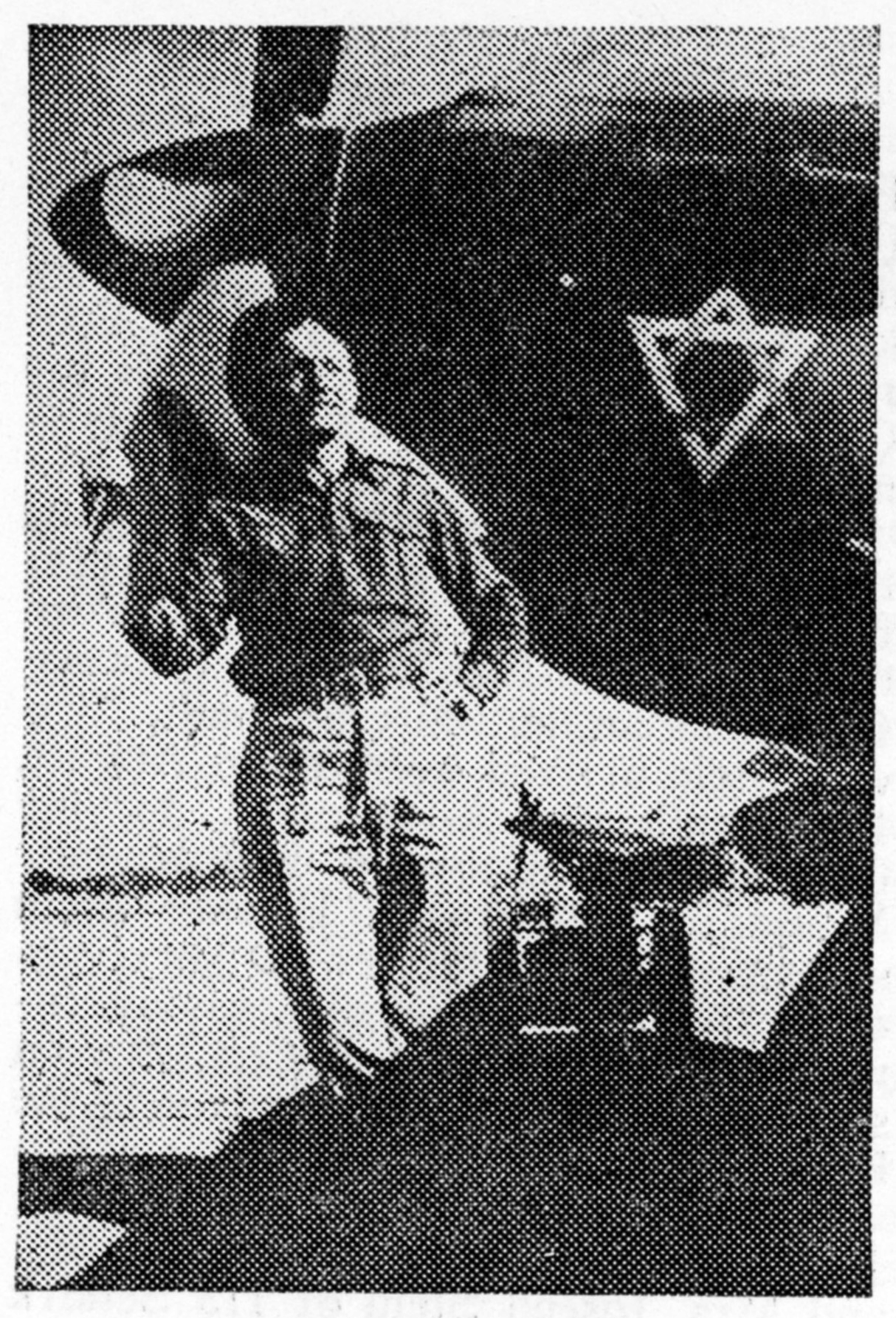 The pilot? Flight Officer Gordon Steinberg, a member of the Royal Canadian Air Force from Toronto.
The pilot? Flight Officer Gordon Steinberg, a member of the Royal Canadian Air Force from Toronto.

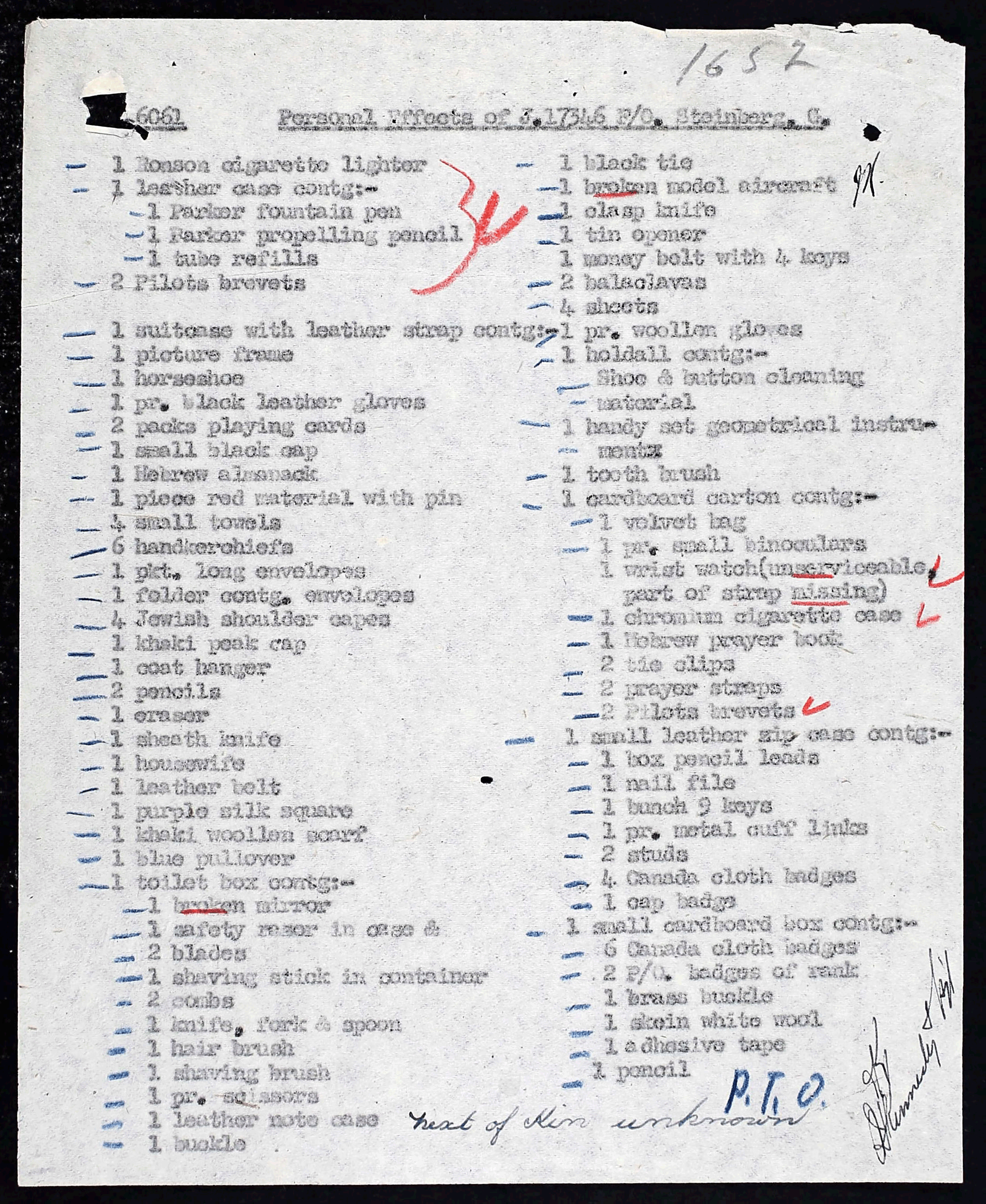 Notable in the list of F/O Steinberg’s possessions is his Hebrew Alamack and Hebrew Prayer Book, as well as his yarmulkah, or kippah (“1 small black cap”), tefillin (“2 prayer straps”), and tallitot (“4 Jewish shoulder capes”), these items listed among a variety of the typical personal possessions of a serviceman and aviator.
Notable in the list of F/O Steinberg’s possessions is his Hebrew Alamack and Hebrew Prayer Book, as well as his yarmulkah, or kippah (“1 small black cap”), tefillin (“2 prayer straps”), and tallitot (“4 Jewish shoulder capes”), these items listed among a variety of the typical personal possessions of a serviceman and aviator. 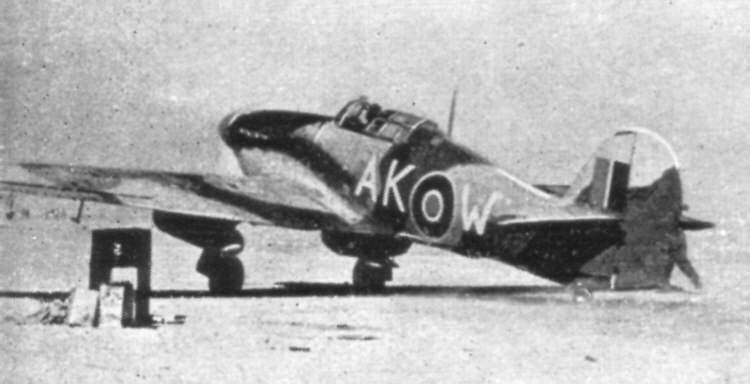 The 213 Squadron Association website carries a photo essay – The Hornet’s Sting – that appeared in FlyPast magazine in 1995. Two images show Hurricanes bearing the Squadron’s “AK” code letters, while a third image shows over thirty of the squadron’s pilots at a Christmas Party at Ikdu in 1943. Perhaps F/O Steinberg was among them?
The 213 Squadron Association website carries a photo essay – The Hornet’s Sting – that appeared in FlyPast magazine in 1995. Two images show Hurricanes bearing the Squadron’s “AK” code letters, while a third image shows over thirty of the squadron’s pilots at a Christmas Party at Ikdu in 1943. Perhaps F/O Steinberg was among them?
